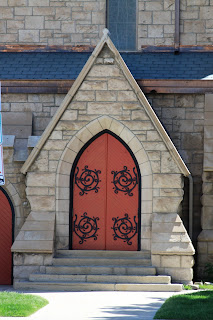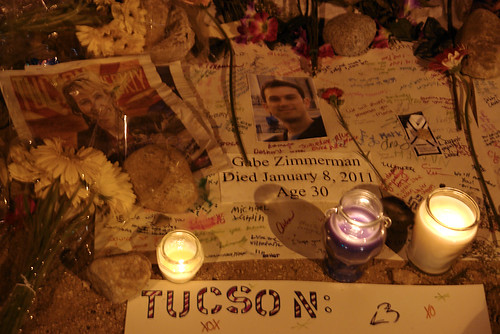Therefore, the conservative, evangelical presence in my memory is far more prominent than I previously gave it credit for. Feel free to draw your own conclusions. ~~Jackrabbit]
 |
| St. Matthew's Episcopal, Laramie |
I'm also playing the Unitarian Minister. I've gone to my local church the past couple of weeks and its been great! Did you know of the Unitarians? Do you have any thoughts on the dominant far right traditions of religion of the state? Baptist, Mormon etc….Andrew,
It makes me laugh to look back and realize how little I knew about the far left and far right religious traditions when I was growing up. Neither of my parents are particularly religious, although my mother made some attempt to raise me as a mainline Lutheran when I was very young. (Since going to church also meant wearing dresses, I fought her tooth and nail.) I didn't know a lot of religious people when I was a kid, but the ones I knew where I grew up in Montana where usually mainline: Lutheran, Catholic, Methodist, Presbyterian. And if they weren't mainline, they were Mormon. The exception to this rule was an uncle of mine, an itinerant vaudeville-style preacher out of the Assembly of God tradition. It never occurred to me that he was an "evangelical" or something different from the others; I just figured he was crazy.
I can still remember my first introduction to Baptists when I was thirteen, on the bus back from swim practice at my new home in Wyoming:
"Hey, you!" This girl yelled at me from across the aisle. I knew her as the daughter of one of my dad's co-workers. "Do you believe in Jesus?"Of course, the irony to this is that I myself became a Baptist for several years, but only after I was in college. In case you didn't know, the church I attended in Laramie was "The Baptist Minister's" church, but I didn't go there until after "The Baptist Minister" left back to Texas. It's also the same church that Jed Schulz attended.
"Um… sure…" I quavered.
"And do you believe you're gonna live forever?" she continued.
"I guess so." Her friends were all laughing.
"All right!" she crowed and slapped me with a high five, and I spent the rest of the drive back to school wondering what the hell just happened.
I guess this goes to tell you that Baptists were an exception to the "rules," or so I saw it, to Rocky Mountain culture. They just don't seem to fit the rest of the society. Most people in the Rocky Mountain region are pretty, well, hands-offish when it comes to deeply personal matters, so evangelicals and their need to insert themselves in one's spiritual lives and moral health feels very out-of-place. So, to refer to the "dominant far right traditions" means realizing that some are more common than others, but none are "dominant" in the culture as a whole.
As a denomination, there have been some kind of Baptists in Wyoming for a very long time, but the Southern Baptist churches only arrived in the state back in the late 1950s, all planted by the same missionary. Therefore, while these evangelical groups are an established part of Wyoming culture, they have always been a small section of the culture, and not predominantly Baptist. Evangelical Lutherans, Nazarenes, and Assembly of God always seemed to be more prevalent to me, but that was just my childhood impression.
 |
| St. Lawrence O'Toole Catholic, on Grand Avenue |
So, when Stephen Mead Johnson says that both Baptists and Mormons are like "jam on toast," he's only really half right. Mormonism is a major influence on Wyoming life (especially southwest Wyoming), and Laramie is home to a large, lavish temple building on the expensive side of town that was nicknamed "the Bellagio." If you want to talk about the conservative traditions which have largely shaped the moral codes of Wyoming citizens, regardless of their individual religious leanings, I wouldn't pick Baptists. With an exception for the majority's religious neutrality, we're really a mix of Father Rogers and Doug Lawses.
As for the Unitarians: I had no idea what they were until I was well into college, and it wasn't until I went to the 2009 production of "10 Years Later" at a Unitarian church in Appalachia that I really learned to appreciate them. It's a very tiny church in Wyoming, maybe three or four churches at the most, and I never grew up in a town that had an active Unitarian congregation until I moved to Laramie. The Laramie UU church was my first, and I learned about it when one of my out-of-state residents when I was an RA was a practicing Unitarian. In general, most people think of it as the "liberal church" and that it's where all the secular college professors go. My fundamentalist roommate once referred to them as "that church that doesn't believe in God" (an unfair characterization, to be sure.) Pretty much anybody not intimately familiar with the church or their mission, I'm afraid, thinks of them more as "outsiders."
On the flip side, the congregation has a great reputation around town for being socially active and caring people, particularly because some members of the church are professors who then also involve themselves actively in the rest of the community. That level of cross-community involvement can be hard to find sometimes. But just like the Baptists always seemed just a little out-of-step with the rest of the Great Plains society around them, you can say that the Unitarians are as well, but for different reasons. The Baptists have rigid social codes that line up with Plains society, but their evangelistic roots set them apart from a private, hands-offish culture. The Unitarians stand out because, although they embrace the "live and let live" tolerance philosophy of the Plains, they also see the social injustice in the dominant culture and constantly strive to change it.
 |
| The LDS church on 15th street, Laramie. |
And so, while it might seem strange to put Stephen Mead Johnson and The Baptist Minister in the same boat, this is where I will leave you.
Until next time,
Jackrabbit
I'd like to extend one last thank-you out to "Andrew" and the rest of his cast/crew for allowing me to publish these conversations. I hope your production turned out to be wonderful.

















